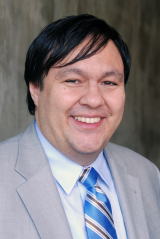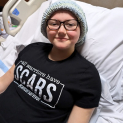High-Throughput Gene-Editing via Microfluidic Cell Deformability to Enable Off-the-Shelf Allogeneic Cellular Immunotherapies

Background: Oncologists are increasingly interested in harnessing the power of their patients' immune systems to aide in the ongoing battle against cancer. One example, adoptive cellular therapies, utilizes types of white blood cells known as T-cells that have been genetically engineered to recognize and recruit other cells of the immune system to attack malignant cells. These approaches have shown promise in pediatric patients with difficult to treat leukemias, but are limited to specialized academic centers in part by how efficiently (and quickly) they can be manufactured as well as by technical limitations in the strategies commonly used to deliver biomolecules for gene modification.
Project Goal: To address these challenges, this proposal focuses on developing and applying microfluidic technologies that enable the delivery of gene-editing agents into cells rapidly via temporary pores that form at cellular membranes as cells are squeezed through narrow channels. This strategy is gentler and less toxic than competing approaches that require the use of external electric fields. To avoid clogging of the device we propose to line the microchannels with bio-inspired surface chemistries that prevent cells from becoming stuck via a "slip and slide" effect. The proposed platform will be used to demonstrate rapid and efficient gene-editing of T-cells at scales compatible with mass production to overcome obstacles in the clinical translation and deployment of cellular immunotherapies.
Project Update 2018: Combining his engineering and pediatric oncology background, we have created a potentially time-saving and cost-efficient way to deliver childhood cancer treatments using nanotechnology. Nanotechnology refers to working with materials that are on the scale of a nanometer, which is the thickness of a piece of human hair sliced down 100,000 times. An interdisciplinary group of chemists, engineers, and physician-scientists are building nanorobotic, gene-delivery drones to deploy genes and gene-editing packages directly to cells quickly, safely and for a lower cost than current delivery methods. For kids battling cancer, this “tiny” technology has the potential to significantly reduce the wait time for delivery of precision medicine, like CAR T-immunotherapy, from a month to weeks.The results of this research were published in the March 2018 edition of ACS Nano. View the full publication here.
Project Update 2019: New therapies that harness the immune system to fight cancer are entering clinical practice for childhood cancer patients whose disease does not respond to standard treatments such as chemotherapy, surgery, radiation, and bone marrow transplantation. Pediatric oncologists activate these defenses by inserting genes into immune cells that teach them to target and to attack cancer cells. Armies of these therapeutic cells are needed to treat individual patients. Rallying these cancer-fighting cells effectively will require new technologies to deliver genetic instructions to about 250 million immune cells, efficiently, quickly, safely, and inexpensively. Existing strategies for manufacturing these therapies require cells from individual patients to avoid unwanted side effects and use viruses to deliver the genetic instructions that activate the immune cells. These viral-based methods are expensive (>$100-500k), slow (~1 month to prepare cells for already sick patients), and potentially expose patients to undesirable effects associated with random delivery of the genetic instructions. Unlike other strategies, we are working toward solutions where the immune cells we use no longer need to come from patients who are already weakened. The success of this project will establish technologies that can be used as assembly lines for these cancer-targeting cells. We are testing and optimizing these cell-manipulation tools so that we can make cellular therapies more widely available to patients everywhere.
Project Update 2021: Our multidisciplinary research group at UCLA takes inspiration from exploring the ultimate limits of miniaturization to develop nanotechnology-enabled tools and methods that support the childhood cancer research community in accelerating the discovery and implementation of innovative therapeutic and diagnostic strategies. New therapies that guide the immune system to target and fight cancer are now important tools in clinical practice that have provided hope for some childhood cancer patients whose disease does not respond to standard treatments such as chemotherapy, surgery, radiation, and bone marrow transplantation. Pediatric oncologists engineer immune cells for these therapies by inserting genes encoding for receptors that teach them to target and to attack cancer cells. Armies of these therapeutic cells are needed to treat individual patients and rallying these cancer-fighting cells effectively will require new technologies to deliver genetic instructions to the hundreds of millions of immune cells needed to produce an effective therapeutic dose, efficiently, quickly, safely, and inexpensively. Moreover, existing strategies for manufacturing these engineered cellular therapies require cells from individual patients to avoid unwanted side effects and use viruses to deliver the genetic instructions that activate the immune cells. We are working toward solutions that will establish a suite of technologies that can be used as assembly lines for producing these cancer-targeting cells. We are testing and optimizing these cell-manipulation tools so that we can make cellular immunotherapies more widely available to patients everywhere.

